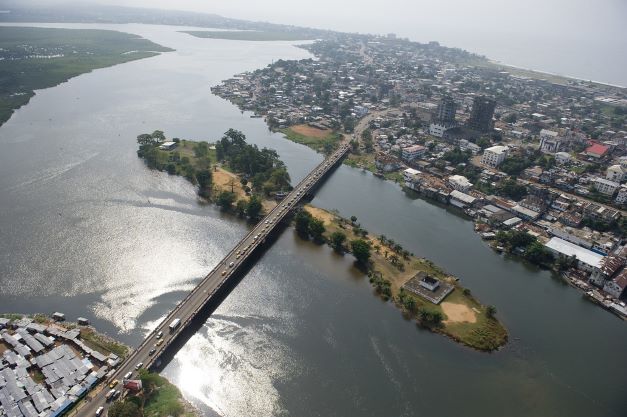PHOTO: Providence Island in Monrovia wherer the settlers first arrived in the 1800s
By Moses Garzeaqu, ytl4youth@gmail.com
As Liberia prepares to launch a year-long commemoration of Liberia’s bicentennial anniversary, Monrovia City Mayor, Jefferson T. Koijee has revealed that the government is doing every possible to make the city clean and welcome hundreds of visitors to this West African country.
The celebration, which is expected to begin in February 2022, marks the bicentennial of a movement that began on February 6, 1820, leading to the repatriation of freed slaves from the United States of America to the shores of West Africa now called Liberia.
It is also meant to reclaim and herald Liberia’s leadership role in Pan-Africanism, rebranding the country after its recent up-and-down history, while also celebrating Liberia’s rich cultural heritage and showcasing the vast tourism attractions.
The bicentennial commemoration will also seek to deepen U.S.-Liberia historic ties and forge stronger economic and social bonds between both peoples especially and the wider diaspora.
The celebration of the bicentennial will be held under the theme, “Liberia: a land of returned, celebrating 200th years of freedom and Pan-African leadership.”
Mayor Koijee, who is currently visiting the United States of America, told the VOA in Washington, D.C., that he and his team are doing everything possible to give Monrovia a facelift, while at the same time highlighting the pivotal role that Liberia has played in Africa.
“We were fortunate by H.E. Ambassador George M. Weah, to have appointed us to serve as the second co-chair of the bicentennial. As you may know the history of our country, we have a very significant role as Liberians. We played a pivotal role in the formation and recognition of the continent of Africa.
“This leadership under his H.E. Ambassador George M. Weah can begin to see how we can project the historical relevance in our Pan-Africanism of existence,” he said.
According to Mayor Koijee, the celebration will also allow Liberians to learn and know about their cultural values, identity, etc.
Mayor Koijee further told the VOA that he and his team are preparing to welcome hundreds of visitors, who are expected to travel to Liberia to grace the country bicentennial anniversary.
On October 21, 2021, Monrovia City Mayor Jefferson T. Koijee, constituted what he termed as the Citizens’ Engagement Board. Mayor Koijee named 14 Liberians, making Madam Mary Broh the Chairperson of the Board and Amb. Juli Endee as Co-chairperson.
The Citizens’ Engagement Board work began November 1, 2021, and January 7, 2022.
Speaking to journalists at the Monrovia City Hall on Tuesday, Madam Broh praised Mayor Koijee for the confidence he reposed in her.
She said: “The Citizens’ Engagement Board will work with the City Government of Monrovia to devise strategies and plans for preparing the City of Monrovia for year-end holidays and the impending 2022 Bicentennial Commemoration and provide advice for the Urban Renewal Initiatives (URI).”
According to the GSA boss, the URI is a road map of 35 deliverables for the city. She added that the Citizens’ Engagement Board will report to the Mayor of the City of Monrovia on the day-to-day happenings about the initiative.
Madam Broh, in consultation and by approval of Mayor Koijee, the Citizens’ Engagement Board is working to provide guidance on sanitation plans and actions for the City of Monrovia.
According to the Office of the Historian of the Foreign Service Institute, U.S. Dept. of State, the founding of Liberia in the early 1800s was motivated by the domestic politics of slavery and race in the United States as well as by U.S. foreign policy interests.
In 1816, a group of white Americans founded the American Colonization Society (ACS) to deal with the “problem” of the growing number of free Blacks in the United States by resettling them in Africa. Land for settlements of the African Americans was difficult to obtain as the indigenous population was unwilling to part with lands they owned and the settlers for the most part did not integrate with the indigenous societies.
Today, about 5% of the population of Liberia is descended from these settlers.
London was the first to extend recognition to the new republic, signing a treaty of commerce and friendship with Monrovia in 1848. Because of fears of the impact, this might have on the issue of slavery in the United States, Washington did not recognize the nation it had played a role in creating.
The United States finally established diplomatic relations with Liberia in 1862 and continues to maintain strong ties with the West African nation, despite significant strains during Liberia’s two civil wars.
In recent years, congressional interest partly has center on the immigration status of over 80,000 Liberian nationals’ resident in the United States.

